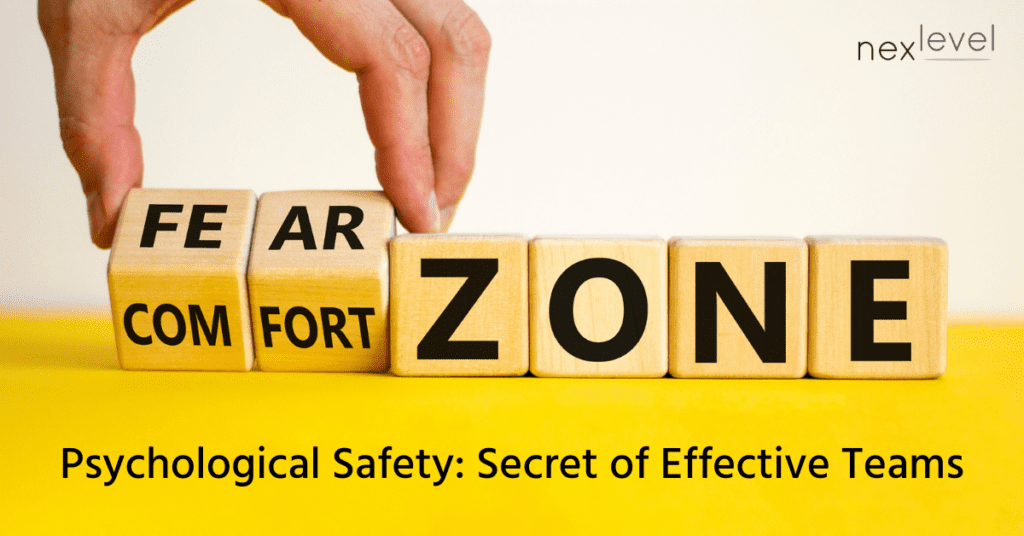Psychological Safety and the Importance to a Team
What is psychological safety and why is it important to successful teams?
One important outcome is team members who feel confident in their ability to speak up and voice their thoughts without the fear of ridicule or trouble. 
A team without psychological safety will play it safe, keep to themselves, and survive, rather than thrive. However, when a feeling of psychological safety is present, teams are likely to take moderate risks, speak their mind, and explore their creativity.
How to Foster a Culture with Psychological Safety
Psychological safety isn’t about being nice, it’s about integrity! If you want to succeed as a team, creating this safe environment must be a priority. It might be difficult to create this culture but we have provided some tips to get you started.
Ask for feedback
As you work to create this new culture, make it clear that you want to hear feedback from everyone. When you show that you are genuinely interested in what others have to say, you will begin to build an environment where everyone feels like they can speak their mind without fear of being judged.
Open communication is key, so ask your co-workers for feedback on how you delivered your message. This will minimize the risk that the message sent was not message received and will increase trust with your team. Ask open-ended questions when closing a difficult or uncomfortable conversation. Ask the team how they felt hearing the message or how it could have been presented more effectively.
It might be hard at first but with time, asking for feedback will come with ease.
The human connection
Speaking human to human seems simple but when things get heated, it can be easy to forget. Mistakes happen and are a part of being human. The intent is never to offend but we must be cautious about how we deliver words. The goal is for each party to walk away satisfied and to feel they were respected. Remember that everyone has opinions, goals, and their own personal approach.
Be curious
Another way to foster psychological safety among your team is to be curious. Avoid playing the blame game. Blame leads to negative conflict which can eventually lead to disengagement. Adjust your mindset to a learning mindset; ask questions and work together to find a solution. Remember to be present during the conversation to digest what the speaker is trying to say. Then, ask for the solution. Continue to ask questions such as:
- what do you think needs to happen next?
- how can I support you to achieve this goal?
- what else do I need to know?
Conflict is a collaborator, not an adversary
It is easy to be disappointed and point fingers when things don’t go as planned. Approach painful situations with an open mind. Your team is there to support one another. Instead of confrontation, find an opportunity to collaborate. Avoid the fight or flight instinct and ask yourself how can we achieve the desired outcome together?
Be proactive and anticipate reactions
Create a safe space by planning for essential meetings or tough conversations. Confront those conversations by preparing for a likely reaction. Think about how your message will be perceived. Ensure your words are heard and understood vs. being heard as an attack. The more prepared you are, the easier things will be.
Regularly measure the psychological safety
If you are a team lead or manager, be sure to check in with your team. Ask them how safe they are feeling or what could increase their feeling of safety. You could even distribute a survey to your team and get their anonymous and unfiltered thoughts on where they stand. Building stronger relationships with people on your team will help you better understand them and what they need to be their best selves. Taking the time to build trust and being real and honest with your team will help them be more willing to open up to you.
Ways Leaders can Increase Psychological Safety
Team leaders are often seen as having all the answers and holding all the keys. Sometimes, leaders can be perceived as intimidating or unapproachable. It is important to show the human side to your team and lead by example.
Below are some additional tips for leaders to encourage and increase psychological safety among their team.
Encourage everyone to speak up
- Be open and express your support for team members by speaking up.
- Ask others for their ideas and encourage them to share their stories.
- Create multiple avenues for team members to share; some will be comfortable speaking in public while others will want to connect in private.
As part of team training and development, these habits should be reinforced. It can be tricky to change old habits so reassurance will be needed at first.
A shared future
Having group discussions about their current head-space and goals for the future ensures everyone is on the same track. Each member plays a key role in the team’s success. A high-purpose work environment links the present day to future ideals. A shared goal gives the team a sense of purpose and unity as they all work to accomplish it.
Develop self-awareness
Every team member is a unique individual with their own way of thinking & behaving. Research shows that people are not as self-aware as they think they are. Developing individual awareness will go a long way to building honest & respectful relationships. When people understand how they work best, they are able to share their preferences around communication, feedback, and recognition with others. Psychologically safe workplaces start with increasing awareness.
Be vulnerable
You are not a robot! Share your vulnerable side. It is also important to reflect on your actions. Understand how you work and how you could be perceived by others. By sharing your own challenges or things you find difficult, you show your team that psychological safety is important to you. This also allows your team to create stronger connections with you, thus creating synergy among the group.
As leaders, you have the responsibility of developing psychologically safe workplaces. When these lessons are applied, the culture among team members will improve. These lessons can also be applied in everyday life to support relationships with family and friends.
At the end of the day, everyone wants the same thing; to be heard, seen, and valued. When people feel like it’s okay to take risks or share their unpopular opinions, you will see more creativity, higher engagement, more learning opportunities, and higher-caliber performance. The importance of safety is critical.
What are some of your insights? Have you fostered a culture of psychological safety in your workplace? Have you successfully applied techniques?
NexLevel’s Team Strategists help leaders shift from the frustration of managing people to the satisfaction of achieving goals. We focus on building psychological safety within teams and would love to hear from you. Contact us today.




